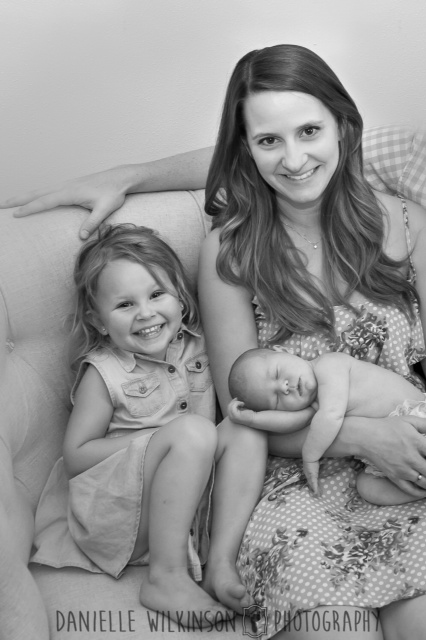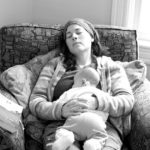A powerful and brave story by Katie of Loyal, Loving, and Learning.
At first glance, having to be hospitalized for Postpartum Depression, at barely twenty-four years-old, seemed like a death sentence, but in actuality, it was the beginning of a new life for me. Having to be admitted to an inpatient psychiatric hospital was one of the best things to ever happen to me.
Upon entering the facility in the middle of the night, I was petrified.
I remember a man with schizophrenia roaming the hallways, and a woman with disheveled hair talking to herself on the sofa in the communal “family room”. I spent my first night sleeping in the clothes I had been wearing for over twenty-four hours on top of a four-inch mattress, paper-thin pillow, and no blanket. I prayed no one would come into my room and assault me since we were required to leave the door open at all times.
Despite the noise and light coming in from the hallway, I finally managed to cry myself to sleep.
I felt very isolated because I was currently the only mother admitted for suffering from PPD. Everyone else was there either to detox from a drug or alcohol addiction or to be monitored until they were stabilized with the appropriate psychiatric medication. Through observation and talking with other patients, I soon learned we really weren’t all that different from one another. No matter our underlying conditions, socioeconomic status, age, gender, or ethnicity, we were all there because we wanted to get better and needed help to do so.
Being hospitalized was crucial because pondering about suicide made me a danger to myself and my baby, but it was through the outpatient cognitive behavioral therapy program I attended after my hospital release that truly changed my life.
The outpatient program, or “therapy camp” as I called it, was held five days a week for six hours a day. I attended this program for a month. My mother-in-law and cousin took turns watching my two month-old daughter, while my mother dropped me off at the center on her way to work. The cognitive-behavioral therapist would set the tone for the day by announcing a “theme”-such as Motivation or Worrying, but the patients were the ones who ran the program, sharing our current struggles and breakthroughs.
That month of outpatient therapy was the single most important month of my life to date.
I learned more than I think I’ll ever be able to share. I learned that just because I lack the motivation to do something doesn’t mean I can’t do it. I didn’t feel like riding a bike or working out or going to yoga, but it didn’t mean I physically couldn’t do it. I just needed to make the decision to get my butt up!

Photo by Danielle Wilkinson Photography
Honestly, I had to designate someone to be the “bad guy” to force me to get moving. Not so fortunately for my husband, he was the designated “bad guy,” but he couldn’t have played a more important role in my recovery.
I learned that getting up and doing the things that once made me feel good, like exercising and meeting up with friends, was best for me. I needed to try to do better in order to feel better. It’s cliché, but I repeated the mantras, “act the way you want to feel,” and “fake it until you make it”! There are still days I live by these mottos. Why else do I wear makeup (most days)? It’s not to be vain, but it makes me feel better about myself; therefore I act better and make healthier choices for my life.
After a couple of months, “faking” the lifestyle I wanted for myself didn’t feel so fake.
For instance, in college I used to practice yoga several days a week. After being released from the hospital, I started going to yoga once a week. It changed me. That one hour on my mat brought me to a place of hope and peace. I held on to that hope and peace wherever I went. I was also fortunate enough to have a family friend personally train me at a gym twice a week. I didn’t always feel like going, but I knew it was the right thing for me to do. It took a few months and a lot of practice, but my mood finally caught up with me, and I felt better. In order to gain momentum in my recovery, I had to get moving.
For a while, I was in a constant state of feeling hopeful, but frustrated. It was mentally and thoroughly exhausting. I knew from reading and listening to other women’s experiences that PPD would pass, but I had a hard time believing it most days. I had a difficult time accepting that it was going to take time to feel like my normal self. And to be honest, I don’t think I ever truly felt like my normal self again. I found a NEW self. A better self. After I had a child, there was no way I could ever go back to feeling like my old self again. My whole perspective on life changed, too.
Suddenly, things like finding the trendiest bar, or buying expensive gifts instead of spending quality time with people, or picking the perfect accessory, or not calling a friend back right away seemed utterly petty and unnecessary. Letting go of the latter helped me become a better version of myself.
Positivity came out of my terrifying experience. It didn’t seem like it ever would, but it did! Postpartum Depression was one of the greatest things ever to happen to me, and it happened for a reason.
I like the person I am post-postpartum much more than the person I was before my first daughter was born.
I’m a lot more easy-going and know when not to sweat the small stuff. Hey, don’t get me wrong—I’m not perfect by any means. I still have first-world problems like everyone else, but I know when to stop and put things into perspective.
Car headlights show people only what’s 160 feet in front of them, but they still make it to their destination—safely, too. In my PPD “haze,” I was only able to see one day (or sometimes only one hour) ahead of me, but I made it to my destination: not being plagued by PPD. Just because I couldn’t see the end result didn’t mean I wouldn’t get there. I just had to keep driving!



Leave a Reply